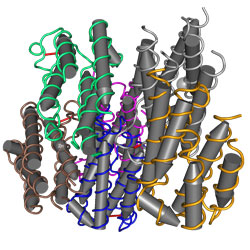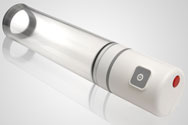Interferon Alpha Peyronie's Treatment
Interferon Alpha Peyronie's treatments have shown some promising results, with relatively mild side effects. This is what makes Interferon Alpha injections interesting Peyronie's injection therapy option.
What Is Interferon Alpha?

Interferon is a protein that is produced naturally in the body and helps regulating the immune system. Interferon has mainly been used to treat various types of cancer, malignant melanoma and certain types of lymphoma and leukemia.
There are three main types of Interferon: alpha, beta and gamma. Interferon Alpha injections have been used to treat Peyronie's patients.
Well known trade names include Intron® A (interferon alfa-2b) and Roferon-A® (interferon alfa-2a).
How Does Interferon Alpha Peyronie's Treatment Work?
Interferon Alpha is used for treating Peyronie's patients because it reduces the production of collagen in the plaque. Healthcare professionals, ideally a doctor, should administer all Interferon Peyronie's injections.
Interferon Alpha injections are injected directly into the plaque once every 2 weeks for up to maximum 6 months.
What Are The Interferon Alpha Benefits?
Interferon Alpha shots deliver the medication directly to the plaque, hence less affect to the rest of your body.
What Are The Interferon Alpha Side Effects?
The Interferon side effects when used for treating Peyronie's are generally mild. The most common Interferon side effects are flu like symptoms, i.e. high temperature, chills and muscle / joint pains. They usually start few hours after injection but usually do not last for long.
These symptoms can be quite severe in the beginning of the treatment but usually become substantially milder with subsequent injections.
Is There Any Health Risk Involved
In Interferon Alpha Peyronie's Treatment?
Interferon Alpha can interact with some drugs but is overall relatively safe drug.
The Results Of Using Interferon Alpha For Peyronie's Disease
Interferon Alpha injections seem to be especially effective in reducing plaque size. Some men have even experienced complete plaque resolution from their Interferon Alpha Peyronie's treatment. Improvements were though notable greater for smaller plaques.
Interferon Peyronie's injections have also shown some efficacy in reducing penis pain and penile curvature.
Scientific Support For Interferon Alpha Peyronie's Treatment
Several studies have concluded that Interferon Alpha injections may be beneficial for treating Peyronie's disease. Like this paper in International Journal of Impotence Research from 2002 concluded:
“Several studies have concluded that IFN-
-2b can be an effective modality of treatment and that many patients placed on a regimen of IFN-
-2b experienced a significant reduction in penile curvature, diminished pain with erection, and decreased size of the plaque” (International Journal of Impotence Research
)
Review of Peyronie's injection studies published in 2007 found seven papers involving the use of Interferon Alpha injections for Peyronie's disease. Five of them showed positive outcomes but two showed no significant benefit (European Urology 2007 ![]() ).
).
Six studies were level 4 quality based on the Oxford Centre for Evidence-Based Medicine criteria i.e. that ranks studies from strongest strength of evidence (level 1) to weakest (level 5).
The last one was level 1 study, the only one (of total 19 injection studies) that met the level 1 criterion. This level 1 study concluded:
“Improvement in penile curvature, plaque size and density, and pain resolution was significantly greater in patients treated with interferonalpha-2b vs placebo...
This single-blind, multicenter, placebo controlled, parallel study demonstrates that intralesional interferonalpha-2b at a dose of 5 x 10(6) units biweekly for 12 weeks is effective and safe as minimally invasive therapy for Peyronie's disease” (J Urol. 2006
)
My Personal Experience
And Opinion Of Using Interferon Alpha For Peyronie's
I do not have personal experience of using Interferon Alpha shots for my Peyronie's disease.
Despite somewhat promising scientific support and mild side effects, Interferon Peyronie's therapy seems not as popular choice as Verapamil Injections in treating Peyronie's disease these days. I have not found any good explanation for this.
If I were considering Peyronie's injection treatment, I would ask my doctor thoroughly about those two treatment options prior to making my mind up which one to go for.
Have you used Interferon Alpha in your fight against the Peyronie's disease?
If so, please use the form below and leave your Comments, or relevant practical advice to other Peyronie's sufferers.






Comments on this article
Leave your comment on this article